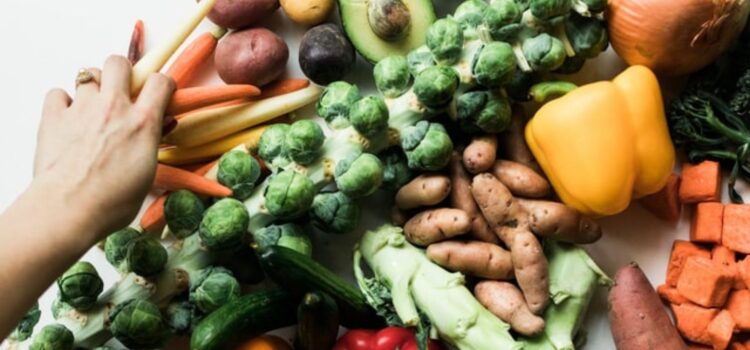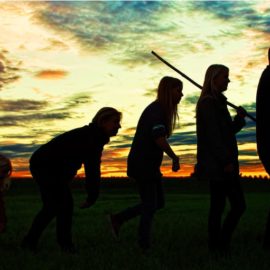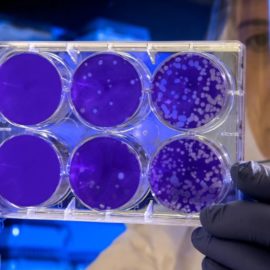

This article gives you a glimpse of what you can learn with Shortform. Shortform has the world’s best guides to 1000+ nonfiction books, plus other resources to help you accelerate your learning.
Want to learn faster and get smarter? Sign up for a free trial here .
Are vegetarians healthier than meat-eaters? Should you stop eating meat?
Americans are the biggest consumers of meat out of any country. They also struggle with obesity, diabetes, cancer, and heart disease at an alarmingly high rate. That’s why many are starting to turn to vegetarianism—however, vegetarianism comes with its own set of health risks.
Continue reading to find out if vegetarians are healthier than meat-eaters.
Is Health Influenced by Diet or Genetics?
Our genes only account for 10-20% of the risk for most leading causes of death, like high blood pressure, heart attacks, and cancer. As evidence of this, when people move from low- to high-risk countries, their disease rates change to those of the new environment. For example, a Japanese person who moves to America raises her risk of heart disease, even though she is genetically Japanese.
But aren’t we dying less, and living longer? Not necessarily. Even though lifespan in America has increased slightly over the past decades, the quality of life at the end of life is worse.
The author Michael Greger of How Not to Die argues diet is behind all of this. Specifically, that a diet heavy in meat, dairy, eggs, and processed foods is much less healthy than a diet based on whole foods and plants.
Here’s some evidence of how plant-based diets increase health:
- People who used to be vegetarians but who went back to eating meat increased their risk of disease significantly—they increased heart disease odds by 146%, stroke by 152%, diabetes by 166%, and weight gain by 231%. Their life expectancy drops by 3.6 years.
- Women who eat more whole plant foods reduce the odds of breast cancer by 90%.
In total, lifestyle accounts for 78% of the risk of chronic disease. Not smoking, having a normal body weight, exercising half an hour a day, and maintaining a healthy diet can reduce the risk of chronic disease by a huge margin.
Additionally, many studies over the past 50 years have demonstrated that the U.S. has some of the highest rates of heart disease in the world, even compared with other Western countries. (Since the first publication of the book, The China Study, a few Western countries have surpassed the U.S. in heart disease deaths.)
If you’re a heart disease patient, there are many reasons you might try changing your diet to manage your disease before taking prescription medications or having surgery.
Benefit #1: Diet is a safer treatment than surgery or medication. There are no known detrimental effects of eating a WFPB diet.
Benefit #2: Diet is a cheaper treatment than surgery or medication. Compared to the cost of bypass surgery, which can set individuals and insurance companies back $200,000, dietary counseling costs about $900, and year-long diet and lifestyle intervention programs cost around $7,000.
Benefit #3: As we’ll see in the Esselstyn and Ornish studies below, diet is a more effective treatment than surgery or medication.
Are Vegetarians Healthier?
A vegetarian diet has been shown to improve health—but only if it’s plant-based and not reliant on processed foods or supplements. Humans evolved over millions of years eating primarily vegetables, so many of our biological responses to food were wired to prehistoric diets.
Today’s modern environment is unnatural, in the sense that we haven’t evolved to handle the new types of food available to us, as well as the quantity available.
- Processed foods now contain much more fat, sodium, and caloric density than we evolved eating. Our normal biological processes haven’t adapted to surviving on modern diets.
- Modern foods are so nutrient-dense that they amplify the dopamine reward circuit. After eating ice cream, ordinary mangos are nowhere near as enjoyable. By eating whole foods, you can reset this sensitivity.
Regulation of food is often strongly influenced by industry. Just like how the tobacco industry fought to show smoking didn’t cause cancer, there is a strong agriculture lobby promoting meat and processed food. So are vegetarians healthier? When avoiding a highly-processed diet, yes.
Health Benefits of a Plant-Based Diet
A plant-based, whole-food diet has been shown to decrease your likelihood of getting a large panel of diseases, from heart disease to Alzheimer’s. Here’s a selection of the many research results cited in the book How Not to Die:
- Drinking 3-4 shots of kale juice a day over 3 months lowers bad LDL cholesterol and boosts HDL cholesterol as much as running 300 miles does.
- Increasing fiber by 7 grams/day reduces the risk of stroke by 7%. For the maximum reduction in stroke risk, eat 25 grams/day of soluble fiber and 47 grams/day of insoluble fiber.
- The more plant-based foods you eat, the lower your hypertension rates. Flexitarians show a 23% reduced risk of hypertension; vegans show a 75% reduced risk.
- Japanese men showed a 25x increase in prostate cancer risk after World War II. This is also associated with a 7x, 9x, and 20x increase in egg, meat, and dairy consumption respectively.
- Premenopausal women who ate 6g of fiber a day had 62% lower odds of breast cancer, compared to those eating <4g a day.
Diet can reverse disease, not just halt it. It’s not too late if you already have heart disease or diabetes. Studies have shown that switching to a plant-based diet can reverse atherosclerotic plaques, reverse the influence of smoking on lung cancer, and decrease the inflammation that leads to many cancers.
Preventing disease is better than treating it. Drugs have side effects, and some disease is irreversible.
Why Plants Help and Meat Hurts
Meat itself seems negatively correlated with health and mortality, even controlling for vegetable intake. In other words, if group 1 eats vegetables, and group 2 eats the same amount of vegetables but adds meat, group 2 shows higher mortality and risk of disease. In these research studies, plant-based diets show lower mortality even controlling for BMI, wealth, and other confounding factors.
Red meats, specifically, have many associated health risks. Eating processed and unprocessed red meat is associated with increased mortality from cancer and heart disease, and lower lifespans—even after controlling for age, weight, alcohol, exercise, smoking, family history, and intake of plant foods. This suggests there is something bad about eating meat itself.
It could be heme-iron—iron is a pro-oxidant (the opposite of an antioxidant) that generates free radicals. The heme-iron in meat is also absorbed more effectively by the digestive tract compared to non-heme iron from plants, and heme-iron also has less autoregulation of absorption to prevent you from absorbing too much. In short, if you have too much iron in your body, you stop absorbing non-heme iron from plant foods, but you keep absorbing heme iron from meat.
Benefits for the Animals
The Omnivore’s Dilemma claims that Americans are confused when it comes to how we treat animals. We vacillate between sentiment and cruelty. We treat dogs as family members, yet consign pigs, which are just as intelligent as dogs, to suffer on factory farms.
We handle our confusion and doubts about eating animals by distancing ourselves from how animals are raised and processed for food.
- We buy meat neatly packaged, from the grocery store.
- We don’t have direct contact with the animals we eat.
Most people would rather not know what it takes to get meat on their dinner plates. The meat industry understands that the more people know about the slaughter of animals for food, the less meat they’re likely to eat. So the industry keeps its practices under wraps and behind factory walls, and the public doesn’t ask many questions.
In the past, our cultural traditions and rituals involving the slaughter of animals resolved any moral dilemmas around killing and eating them, thus allowing people to eat meat without agonizing about it. We mostly lack such traditions today.
Today most people remain deliberately ignorant of how we process animals for food, and they continue eating meat. As an alternative, a relative few become vegetarians.
The factory farm industry is a relatively new idea and is specific to America. No other country has so thoroughly industrialized the process of raising and slaughtering food animals. Efficiency is the priority, with cruelty a side-effect.
Here’s how it works. At the National Beef Plant in Liberal, Kansas, animals are led up a steep ramp and through a blue door.
- They go into a chute single file.
- The ramp tilts until the animal’s feet are off the ground and it’s carried along on a conveyor belt. A stunner positioned on a catwalk fires a bolt into the cow’s forehead.
- Feet are hooked to an overhead trolley and the animal is conveyed to a bleeding area where its throat is cut. (If the animal doesn’t immediately die, the conveyor is stopped and the animal is shot again.)
The extent to which the animals may suffer is hidden from the public eye. By contrast, Salatin’s open-air process for slaughtering chickens lets customers see and decide for themselves if they want to. Even if customers don’t want to see the operation, maintaining transparency helps ensure the chickens are killed humanely.
A third option besides denial or giving up meat is being informed about what goes on and influencing the process. If people could see what happens in big slaughterhouses, maybe they would choose smaller ones. If the walls of our meat industry were transparent, we would likely change how we do things.
Meat would get more expensive if efficiency were given up to treat animals humanely — and maybe we’d eat animals with the consciousness and respect they deserve. Are vegetarians healthier for benefiting animals? Not necessarily; although they are often more aware of where their food comes from.
Health Dangers in the Meat Industry
As described in Fast Food Nation, the meat industry is not the safest place to be. Disease spreads easily in unsanitary conditions, cattle are packed close together, cattle farms are harming the environment, and chickens are genetically modified, bringing quality of life to an all-time low.
Deadly Food Poisoning
Deadly outbreaks of E. coli, a virulent pathogen primarily found in beef, have become far more common since the rise of fast food. This is largely due to fast food’s centralized system of food production, which exponentially expands the reach and scope of outbreaks. Today’s slaughterhouses and meatpacking plants are marked by appalling sanitary conditions, where cattle are packed into close quarters, given little exercise, and splash around in pools of manure. After the animals are slaughtered, poorly trained workers often handle the carcasses improperly, pulling out the stomach and intestines of the cattle by hand and spilling the contents of the digestive system all over the slaughterhouse floor and into the meat that’s sold to consumers.
Ground beef is particularly prone to contamination because the package that’s sold in the supermarket does not come from a single animal. Because of how it is processed and shipped, the meat of just one infected cow can find its way into 32,000 pounds of ground beef. Are vegetarians healthier because they avoid processed meat? It certainly is a factor.
Cattle Harms the Environment
The article “Why You Should Go Animal-Free” breaks down five myths regarding beef and its impact on the environment.
Myth #1: Beef is climate-neutral because a major greenhouse gas that cattle produce is methane, which breaks down relatively quickly. It’s true that methane does break down relatively quickly, but maintaining current methane levels isn’t enough to limit climate change—we need to reduce methane levels. Because methane breaks down so quickly, decreasing cattle populations is actually a good place to start because the effect will be felt within a few years.
Additionally, methane isn’t the only greenhouse gas associated with cattle—carbon dioxide is also an important player.
Myth #2: Eating grass-fed beef is fine because it’s low-carbon. Grass-fed beef is only relatively lower carbon than one other type of beef production: beef that’s been intensively reared on deforested land. (This comparison is also somewhat debatable—grass-fed cattle require more land and live longer than intensively reared cattle, so both may produce similar emissions.)
Eating beans and pulses are truly low-carbon. Additionally, returning pastureland to nature would actually reduce carbon—if all pasture land worldwide reverted back to native vegetation, that would remove 15% of the world’s greenhouse gas emissions.
Myth #3: Cattle help store atmospheric carbon in the soil. This is true—when cattle nibble and step on the grass, the grass responds by putting down deeper roots, which allows it to absorb more atmospheric carbon. However, this storage only offsets 20-60% of cattle emissions, so the net effect of cattle is still to increase carbon.
Additionally, carbon storage maxes out after a few decades and carbon can be rereleased during drought or if the land is reworked.
Myth #4: Some land isn’t suitable for agriculture and the only thing that will grow is grass, so cattle may as well graze on it. It’s true that some land isn’t suitable for crops, but this land could be returned to its natural state or used to grow trees, all of which would store carbon.
Myth #5: There’s more wildlife in pastures than cropland. This is likely true, but there’s far more wildlife in natural habitats than pastures, so it would be better to return pasture to nature than transform cropland to pasture.
The McNugget and the Poultry Industry
A similar situation has played out in the poultry industry. The invention of the McDonald’s Chicken McNugget in the early 1980’s reshaped how American chickens were raised and sold. It transformed a bulk agricultural commodity into a branded, manufactured, and value-added product. As such, fast food companies began to take a much greater interest in how poultry farmers raised their birds, seeking ever-greater product uniformity.
The idea behind the McNugget was simple: a boneless chicken finger food no larger than the size of a human thumb. The early tests of the product were so successful that McDonald’s partnered with leading chicken processor Tyson Foods to ensure an adequate supply. The Arkansas-based Tyson Foods even developed a new breed of chicken exclusively to be made into McNuggets.
The success of the McNugget made McDonald’s America’s second-largest purchaser of chicken (KFC, perhaps unsurprisingly, was #1). Their massive buying power (and that of the few major chicken processors from whom McDonald’s buys, like Tyson) wrought major changes for the nation’s chicken farmers. As with beef, consolidation and concentration became the hallmarks of the industry.
Today, most chicken growers aren’t independent at all—they’re essentially contracted employers of the big chicken processors, on whose behalf they raise the birds. Companies like Tyson own the chickens themselves and closely supervise every aspect of how they’re raised, including veterinary schedules, feeding schedules, and equipment. The growers exercise almost no independent discretion at all. What the chicken grower does provide is the labor and the major capital expenses like land, fuel, and chicken coops. They often must go deep into debt in order to make the necessary capital investment to become a Tyson contractor.
All of this is deeply distressing for American ranchers and poultry growers. These were once seen as the central icons of the American West, the epitome of American ruggedness and independence. For them to be reduced to the status of hired hands for the big agribusiness firms represents more than a reduction of their livelihood—it is a loss of a way of life and destruction of one of the most powerful symbols of the American historical experience.
Arguments Against a Vegetarian Diet
Not everyone thinks vegetarians are healthier. Tim Ferriss, the author of The 4 Hour Body, doesn’t strictly eat a 100% plant-based diet for two reasons:
Reason #1: Evolutionary biology and anthropology suggest humans should eat meat:
- No healthy indigenous cultures ate a 100% vegan diet.
- Chimpanzees, our closest relatives, eat meat.
- The human body produces elastase, an enzyme that breaks down connective tissue.
Reason #2: Empirical evidence suggests health problems arise from not eating animal products:
- While researching the book, the author met many vegan women who experienced miscarriages. After changing their diets to include meat, they were able to have healthy pregnancies.
- Male children with hypospadias (misplaced urethra) are 500% more likely to have vegetarian mothers than mothers who eat meat.
Ferriss doesn’t know exactly why avoiding animal products causes health problems, but he thinks it’s either because vegetarian staples, like soy, are responsible, or because animal products are critical to hormone production.
What About Protein?
Are vegetarians healthier even if they aren’t getting protein from meat? One thing we think we know about nutrition is that we need lots of protein to be strong and healthy. But we may not need as much as we think, and we probably don’t need animal protein at all.
Protein is a chemical made up of chains of hundreds of amino acids. It’s an essential part of our biological makeup—proteins function as enzymes, hormones, tissues, and transport molecules, among other roles.
Our bodies need to replace proteins when they get old and wear out. You can imagine a protein as a string of different colored beads, each color representing a different amino acid. When the string of beads breaks, we need to build a new one from new beads.
Our bodies make many of these “beads,” or amino acids, on their own, but there are eight they can’t produce. We need to consume these “essential” amino acids in order to replace some of our bodily proteins.
Myths About Protein “Quality”
The highest “quality” proteins are the ones that provide us with all eight of the amino acids our bodies can’t make themselves. The best quality proteins come from animal foods, particularly milk and eggs. The protein in plants is generally lower quality because a single plant source usually lacks one or more of the eight essential amino acids.
But the term “quality” is misleading. A protein can be “low quality” but still healthier than its high-quality peers.
“Low-quality” plant proteins are slower to synthesize into the proteins our body uses, but unlike animal proteins, they don’t increase our risk of disease. Animal proteins may be more efficient, but efficiency doesn’t always mean healthy. Are vegetarians healthier? As long as they are getting the right amino acids.
People worry that vegans (who don’t eat animal protein) don’t get the right amino acids, but as a group, plants contain everything we need. It’s not necessary to eat a huge quantity of plant proteins to reap their benefits, and we don’t need to meticulously plan each meal. As long as we’re eating a variety of plants, our amino-acid needs will likely be taken care of.
If we can get all the protein we need from plants, why do we associate protein with animal foods? The outsize role played by animal proteins in our culture and our understanding of healthy eating has been formed by a little science and even more myths.
When protein was discovered in the 19th century, people already believed that eating animals increased their endurance and strength. Eating animals also symbolized our dominance over other creatures. Any evidence of the benefits of animal protein was welcome news to a society that took pride in its place at the top of the food chain.
Further, meat was expensive. Consequently, it was a status symbol: Eating meat demonstrated that you were rich and relying on plant foods demonstrated that you were poor. Some upper-class people believed that the lower classes were lazy because they didn’t eat as much meat as those who could afford it.
These attitudes helped make protein synonymous with meat, and we’ve inherited them, whether we realize it or not. Even today, beef is probably the first thing you think of when someone says “protein.” We still believe that people who don’t eat meat are anemic and weak and that animal protein is an essential part of a healthy diet.
More information regarding protein in a vegetarian diet can be found in the book How Not to Die.
Do Vegetarians Need Supplements?
In research studies, eating health supplements doesn’t have as positive an effect as whole foods. This might be because whole foods contain many other benefits, such as fiber and other micronutrients. Supplement extracts also introduce the risk of contaminants and toxicity. So are vegetarians healthier? As long as they are not replacing most whole food nutrients with supplements.
The China Study has eight principles for developing good nutrition and the second addresses supplements. This book suggests that vegetarians are healthier as long as they don’t rely on supplements.
Avoid supplements—get your nutrients from food, not pills.
Supplements are problematic for a variety of reasons. First of all, the whole concept of a supplement ignores the fact that it’s the whole food, not a particular nutrient, that provides the most benefit.
Additionally, supplements are poorly regulated, so you don’t really know what you’re getting when you buy them. They may have unforeseen side effects and some can cause harm. For example, many researchers caution against taking beta-carotene supplements because they’ve been shown to increase lung cancer risk.
Another problem is that supplements encourage people to eat poorly and “compensate” by taking pills.
While Dr. Greger from the book How Not to Die recommends that all your nutrients come from whole foods, he does suggest that a few nutrients be supplemented when on a plant-based diet.
Vitamin B12
- B12 is made only by microbes and is present in meat but not plants.
- B12 deficiency can lead to paralysis, psychosis, and blindness.
- Dosing
- If you’re under 65: 2,500 micrograms of cyanocobalamin once a week, or 250 micrograms a day
- If you’re over 65: up to 1,000 micrograms daily
Vitamin D
- If you live above 40 degrees latitude, during the months of November through February, you might get so little direct sunlight that you don’t produce any vitamin D.
- Dosing
- One 2,000 IU vitamin D3 daily
Iodine
- Dosing
- 150 micrograms daily
- Green-light: Seaweed has iodine; eat two sheets of nori.
- Yellow-light: Seafood and dairy milk
- Red-light: Iodized salt—the sodium is too high.
Omega-3s
- Dosing
- 250mg omega-3s
- Algae oil or yeast products are best.
- Avoid fish oil. They contain PCBs, mercury, and pollutants. Mercury from seafood can worsen cognitive performance.
Are Vegetarians Healthier Than Meat-Eaters?
As noted throughout the article, your diet is a huge factor in your health, and eating a vegetarian diet has been shown to decrease the likelihood of developing many diseases that Western cultures face today. Vegetarian diets also reduce your contribution to animal cruelty and harsh environmental impacts.
With that being said, there are always exceptions. Someone who eats meat occasionally and mixes in a variety of whole foods is likely healthier than a vegetarian who mostly eats processed foods and relies on supplements. Tim Ferriss brings up the point that a vegetarian diet helps you gain knowledge. In the end, vegetarians are healthier not solely because they avoid meat, but because they are more aware of where their food comes from and what they are putting into their bodies.

Want to fast-track your learning? With Shortform, you’ll gain insights you won't find anywhere else .
Here's what you’ll get when you sign up for Shortform :
- Complicated ideas explained in simple and concise ways
- Smart analysis that connects what you’re reading to other key concepts
- Writing with zero fluff because we know how important your time is






